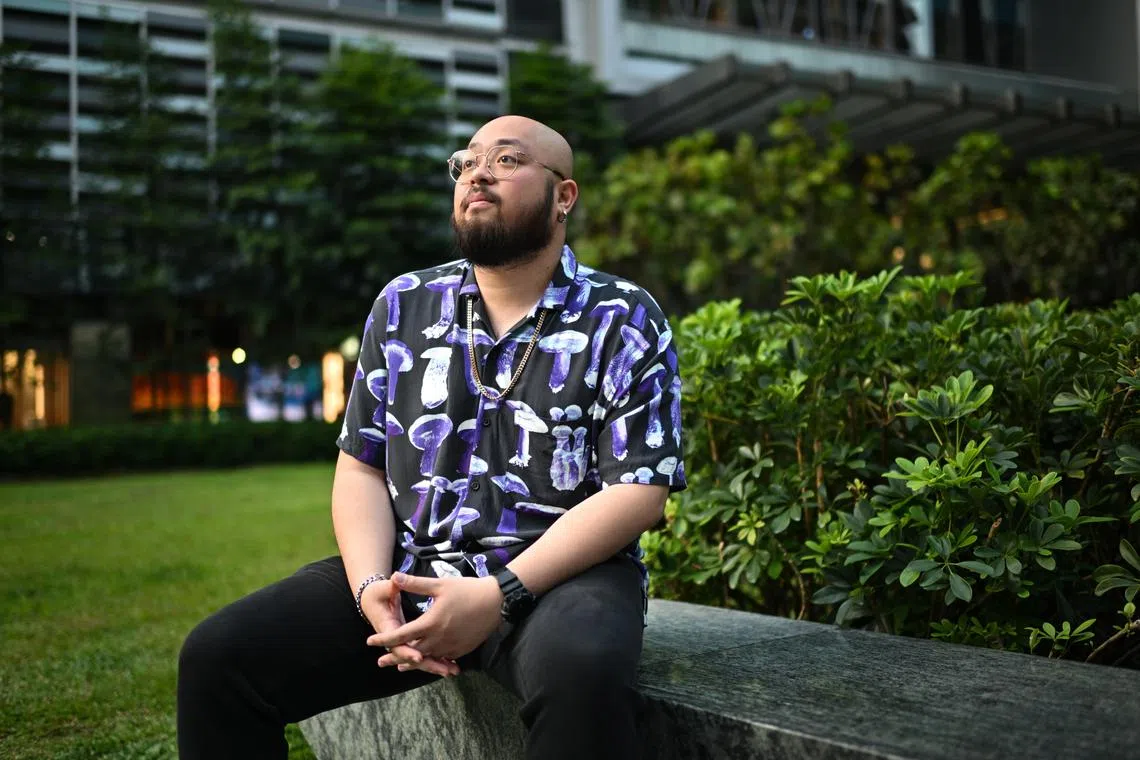Your genes can affect how you react to specific drugs and diseases
Sign up now: Get ST's newsletters delivered to your inbox

Mr Wesley Tan, who was diagnosed with Type 2 diabetes at 17, is a participant in a precision health pilot on pharmacogenetics.
ST PHOTO: SHINTARO TAY
SINGAPORE - During a recent routine visit to the endocrine clinic at National University Hospital (NUH), diabetic patient Wesley Tan, 29, was asked by research coordinators if he was keen to join a pilot study that aims to tell individuals ahead of time if a particular drug is unsafe or ineffective for them.
He said yes and became one of 122 individuals who signed up for the study. Mr Tan was only 17 when he was diagnosed with Type 2 diabetes, and he had to learn how to give himself insulin injections before meals.
“I remember doing it at a hawker centre and at the table beside me, a father told his daughter, ‘You better study. If not, next time, you’ll take drugs like this man!’” Mr Tan said.
Having to inject insulin about four or five times a day, and go for follow-up checks every three months, he is constantly reminded of the need to take care of his health.
“There may come a time when I will require medication for any sort of illness that (may come),” he said. High blood sugar levels can lead to various complications such as heart disease, kidney disease, nerve damage and more.
Pilot participants take a test that screens for a panel of genes, to see if they have genetic variants that could lead to a bad reaction to medications commonly used for conditions such as stroke, cancer and depression, or render them less effective or useless.
This is a field in precision medicine known as pharmacogenomics (PGx), which looks at how a person’s genes affect the way he reacts or responds to drugs.
It is an example of precision medicine, an approach to disease treatment and prevention that takes into account the individual differences in genes, environments and lifestyles.
Singapore’s drive to use precision medicine is led by Precision Health Research, Singapore (Precise). It was set up in 2021 to coordinate a whole-of-government effort to implement Singapore’s National Precision Medicine strategy.
This 10-year precision medicine research road map is now in its second phase.
The first phase established a Singaporean reference database containing 10,000 genomes with the SG10K genetic study. One of the findings was that one in four Singaporeans carries a genetic variant that increases the risk of life-threatening side effects from at least one medication.
In the second phase, the SG100K study
Phase three, which could start in 2025, would involve many more participants, said Professor Patrick Tan, executive director of Precise.
“You can expand precision medicine away from the individual to populations as well. And this is where the engagement of efforts such as Healthier SG comes into play,” he said.
Healthier SG
The PGx pilot test is currently for the multiple genes that may impact 30 drugs such as codeine (which is used to treat pain), statins, several chemotherapy drugs including mercaptopurine, and antidepressants like amitriptyline, said Dr Elaine Lo, lead pharmacist of the PGx pilot and a principal clinical pharmacist at NUH. More drugs may be added later.
Mr Tan’s pharmacogenomics report, which he can access via an online portal, will be included in the electronic medical record system. In future, if a doctor were to prescribe him a drug that he is allergic to, a notification would be triggered in the system.
The pilot will also look into a hotline that doctors can dial to contact a team of trained pharmacists who can provide drug information support.
Professor Goh Boon Cher, the clinical co-principal investigator of the PGx pilot, said researchers aim to get 1,000 adult participants from participating institutions such as NUH, the National Cancer Centre Singapore, Alexandra Hospital, Ng Teng Fong General Hospital, Singapore General Hospital and Tan Tock Seng Hospital (TTSH).
Pharmacogenetic guidelines on drug-gene pairs exist elsewhere, but Singapore wants to construct its own, as the research in Western populations is not always applicable to Asian populations, he said.
“It’s important that we have a local team of experts to curate the data and make sure that it pertains to our population of basically Chinese, Malays and Indians, and various other races,” said Prof Goh, a senior consultant at the National University Cancer Institute, Singapore.
The list of drugs in the pilot comes with a story of its own. Mercaptopurine, an oral chemotherapy drug used for treating childhood leukaemia, was long ago found to lead to infections, anaemia and bleeding in some patients.
Research by the St Jude Children’s Hospital in the United States showed that it was because these children had a variant of a gene called Thiopurine Methyltransferase, or TPMT.
In Singapore, some children treated with the drug became similarly ill, but tests showed that they did not have that variant. “So, for many years, we were wondering, how could that be?” said Prof Goh.
The answer came a couple of years ago from a research collaboration between a St Jude team and a local children’s cancer team, he said. They found that one of the children here had a variant of the NUDT15 (nudix hydrolase 15) gene, which also affected the body’s ability to metabolise mercaptopurine. The gene variant is more common among Asians.
Test results for the pilot study are being processed in a lab at TTSH, currently the only facility that offers multi-gene testing.
TTSH also recently started offering pre-emptive multi-gene testing services for the public, as long as they are referred by a clinician who can then interpret the results for them, said Dr Goh Liuh Ling, senior principal scientific officer at TTSH’s personalised medicine service. The cost of testing starts from $300, depending on the complexity.
The public can also buy direct-to-consumer DNA test kits that screen for pharmacogenetic risk and disease risk, and they can even analyse how a person’s body responds to the nutrients in his diet.
But experts warn of risks. For instance, if the kits do not screen for a variant prevalent in the Singapore population, the test results could give a false sense of assurance, Dr Lo said.
“I think the bottom line is that too much information at one time can be harmful,” Prof Goh said, particularly if people do not know how to act on the information they receive.
Breast cancer screening based on risk, not age
Another study funded by Precise is looking at the feasibility and cost-effectiveness of a risk-based approach to breast cancer screening, to encourage more women to go for screening.
Recruitment for the BREAst screening Tailored for HEr (Breathe) study
So far, 10 women predicted to be at high risk were found to have breast cancer. One was in the 35-to-39 age group, six were aged between 40 and 49, and three were aged between 50 and 59.
Currently, women aged between 50 and 69 are recommended to get a mammogram every two years, while those between 40 and 49 years should get one every year, if advised to do so by a doctor.
Associate Professor Mikael Hartman, the study’s clinical co-principal investigator and head of breast surgery at NUH, said: “Instead of using age as a marker of when to start screening mammograms, we are suggesting that we can augment the current screening guidelines by estimating women’s risk and by knowing that risk, we can translate that into an appropriate age to start screening.”
As breast cancer is complex, a combination of various methods, including a genetic test, a questionnaire to find out lifestyle and hormonal risk factors, and an analysis of mammographic density can be used to assess a woman’s cancer risk, said Dr Li Jingmei, the study’s scientific co-principal investigator.
“From the mammography, we can predict the woman’s future risk of getting breast cancer, so that’s another risk factor,” she said.
The team is now looking at how to encourage women to go for screening.
There have been a lot of developments in the genetic predictive testing space, but not all diseases are suitable for using genetics.
“Breast cancer is one of those cancers that have higher heritability, (so) using genetics will be a better choice. But if we look at other cancers, which have very low heritability, for example, lung cancer... then using genetics to test doesn’t make so much sense,” said Dr Li.
Heritability is a measure of how well differences in people’s genes account for differences in their traits, such as eye colour and intelligence, as well as disorders like schizophrenia.
The three other pilots funded by Precise include looking at the challenges of clinically implementing genome testing to pick up individuals predisposed to having very high cholesterol levels, which puts them at high risk of having an early heart attack, and those with hereditary cancers or primary glomerular diseases, which affect kidney function.
Aside from the studies funded by Precise, other precision health research projects are happening, such as one at TTSH that aims to predict heart disease in the local population. This study will incorporate PGx, so participants will also receive their drug response results.
Adjunct Associate Professor Leong Khai Pang, head of TTSH’s personalised medicine service, said: “Imagine that if you do one test, you can get a pharmacogenetic report to see if certain drugs are effective and also find out the risk of a disease. For all the chronic diseases that we see now, I think there could be tests to predict our risk.”
In the future, studies could be done to look at one’s genetic predisposition to conditions such as breast cancer, chronic kidney disease and depression, he added.
This is just the start. Dr Clive Tan, a founding member of the Precision Public Health Asia Society in Singapore, which was set up to promote precision public health, said: “Although evidence is mounting and practices are changing, it will take years to develop and adopt the technologies, and individual-level behavioural changes en masse.”
Right now, precision health efforts are happening in silos, and there is too much competition and insufficient collaboration for it to succeed at scale, he said.
Earlier in 2023, Health Minister Ong Ye Kung said Singapore should embrace technological advances in medical science, such as precision medicine, gene editing and artificial intelligence, while remaining aware of the risks and pitfalls of new technology. These will need to be addressed along the way.
To reap the benefits of precision medicine, the technology, delivery systems, legislation, clinical protocols, ethical standards and patient education have to all be in place, he said.
Prof Tan said: “At the end of the day, it’s a question of should medicine be one size fits all, or should it be tailored based on who you are?
“I believe that’s where medicine is going. Should medicine be focused on treating patients with late-stage disease, or should medicine move towards keeping people healthy?
“I think the answer is that we should move towards keeping people healthy.”
The new frontier – precision health – will be a crucial tool to deliver the right treatment to the right populations, he said.
Correction note: This article has been updated to reflect that Dr Elaine Lo is a principal clinical pharmacist at NUH.



